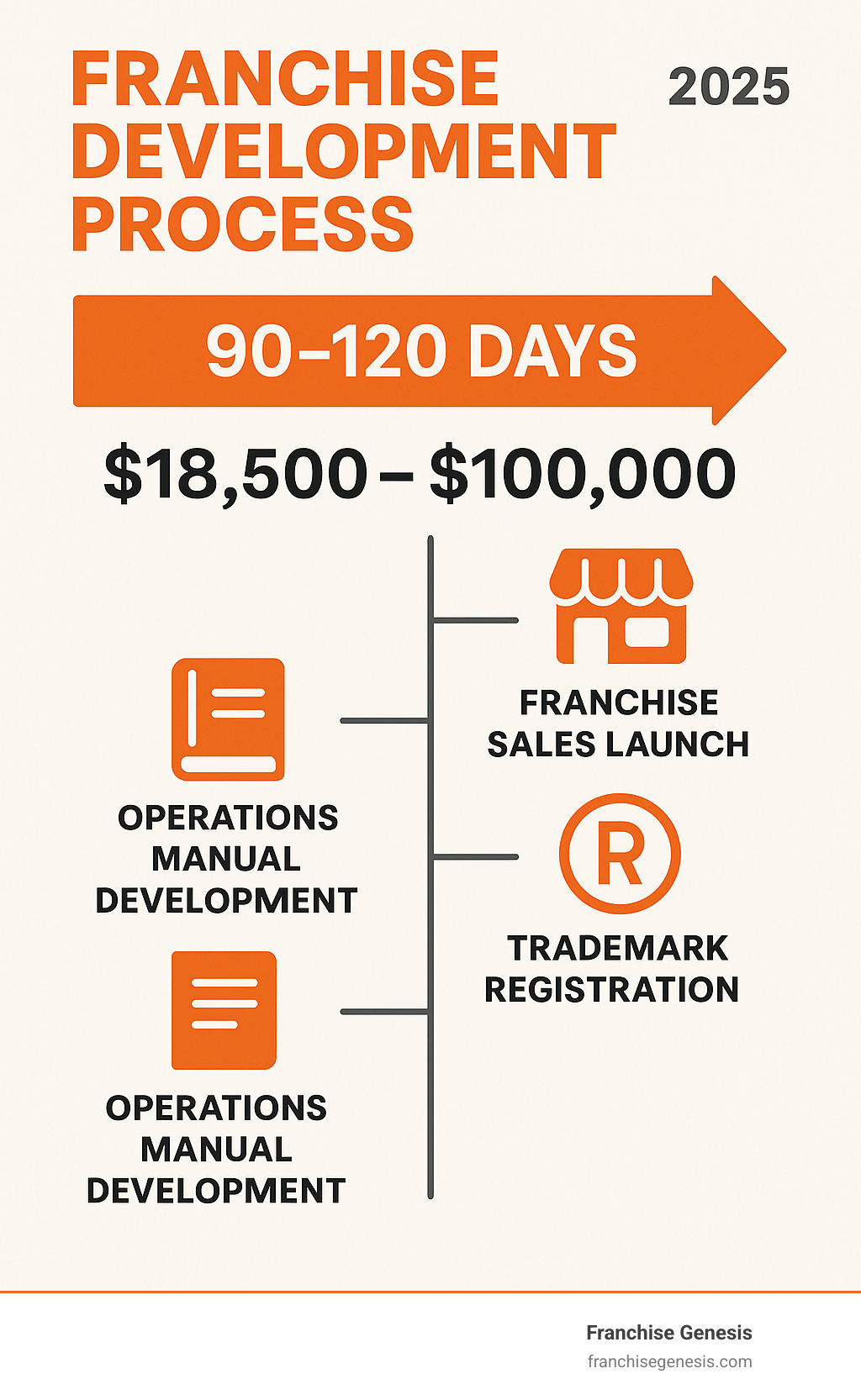Why Franchising Your Business Could Be Your Best Growth Strategy
Learning how to make my business a franchise begins with understanding its power. Franchising is a proven path to rapid expansion, allowing you to grow using other people’s capital while maintaining brand control. The core idea is to create a business model so systematic that it’s less dependent on your personal involvement and more scalable across multiple locations.
The essential process involves several key steps:
- Evaluate Readiness: Confirm your business has proven profitability and replicable systems.
- Legal & IP: Develop your Franchise Disclosure Document (FDD) and register trademarks.
- Operations & Structure: Create a detailed operations manual and define your franchise fees and territories.
- Sales & Marketing: Build a strategy to attract qualified franchisees.
This process typically takes 90 to 120 days and costs between $18,500 to over $100,000, depending on your business’s complexity.
From KFC to modern service brands, franchising has created extraordinary growth stories. Today, franchised businesses thrive in over 80 industries, fueled by entrepreneurs of all ages seeking proven opportunities.
I’m Monique Pelle-Kunkle, Vice President of Operations at Franchise Genesis. I’ve guided hundreds of business owners through the franchising journey, including scaling one concept to over 100 locations in its first year. My team and I specialize in helping entrepreneurs, including many women-owned businesses, successfully launch and grow their franchise models.

Is Your Business Ready for Franchising? The Litmus Test
So you’re wondering how to make my business a franchise? Before diving in, it’s crucial to assess if your business is truly ready. Not every successful business is built for franchising, which requires a specific kind of fitness.

The readiness test looks for proven profitability, replicable systems, a unique value proposition, brand strength, scalability, and market demand. As Forbes notes, this evaluation is critical. There are compelling reasons why you should franchise, but only if the foundation is solid.
Evaluating Your Business Concept
The key question is: Can someone else replicate your success? The best franchise concepts have systematized operations that don’t rely on an owner’s unique magic. Every process, from customer service to inventory, must be documented so a new owner can achieve consistent results.
Your business model must be teachable. An average person with proper training should be able to master it. Think of McDonald’s, which created systems so clear that teenagers could deliver consistent quality worldwide.
Does your business have a real competitive advantage? Whether it’s a better service delivery method or an underserved niche, this unique quality must attract both customers and potential franchisees.
Before franchising, we strongly recommend proving your concept works in multiple locations. Having at least one or two additional profitable units demonstrates that your success is replicable, not just tied to your personal management of a single location.
Assessing Your Financial and Personal Commitment
Franchising will challenge both your finances and your mindset.
The capital requirements are significant. While you’ll grow using franchisee investment, you need upfront capital for legal fees, operations manual development, and marketing. The cost to franchise ranges from $18,500 to over $100,000, depending on your business’s complexity.
More importantly, you must be ready for a massive shift in your role from operator to leader. You’ll spend your time teaching, supporting, and guiding independent business owners who have invested their life savings in your concept. This means accepting long-term support obligations and becoming a brand guardian for your entire network.
Are you prepared for this change? Some owners thrive in this new leadership role, while others prefer hands-on operations. Understanding your preference is crucial before you commit to the franchising path. For more on this transition, explore our Franchising Insights page.
The Essential Steps: How to Make My Business a Franchise
Once you’ve confirmed your readiness, it’s time to build your franchise system. The journey of how to make my business a franchise can be broken down into a clear roadmap. Think of it as building a bridge from your current success to your future empire.

This process rests on four pillars: strategic planning, legal documentation, operations development, and franchise sales. Each step builds on the last, creating a solid foundation for growth. At Franchise Genesis, we’ve refined this process over years of experience. You can see our full approach in our From Business to Franchise Conversion guide.
Step 1: Define Your Franchise Structure and Financials
This is the blueprint for your franchise offering. Key decisions include:
- Franchise Structure: Will you offer single-unit franchises, multi-unit development agreements, or master franchise rights for entire regions? Each model suits different growth speeds and franchisee profiles.
- Territory Definition: Territories must be large enough for a franchisee to succeed but defined carefully to maximize your brand’s market penetration. We help analyze demographics and competition to create balanced, protected territories.
- Initial Franchise Fee: This one-time fee, typically $25,000 to $75,000, covers your costs for recruiting, training, and launching a new franchisee.
- Ongoing Royalties: This is your primary revenue stream, usually 4% to 8% of gross sales. It funds your ongoing support, brand development, and system improvements.
- Advertising Fund: A contribution of 1% to 3% of gross sales is common. This pools resources for powerful marketing campaigns that benefit the entire system.
These financial decisions are critical. We help model different scenarios to create a structure that is both profitable for you and attractive to high-quality franchisees. Find out more on our Franchise Growth Strategies page.
Step 2: Steer the Legal Requirements to Make My Business a Franchise
Franchising is a heavily regulated industry, making expert legal guidance essential. Getting this step wrong can lead to fines and lawsuits.
The cornerstone is the Franchise Disclosure Document (FDD). This comprehensive legal document, required by the Federal Trade Commission, contains 23 specific sections detailing everything about your franchise offer, from financials to leadership history. You must provide the FDD to prospects at least 14 days before they sign any agreement or pay any fees.
Your Franchise Agreement is the binding contract that defines the rights and responsibilities of both you and your franchisee. It covers territory rights, fees, operational standards, and more.
Intellectual property protection is vital. This includes trademark registration with the U.S. Patent and Trademark Office to protect your name and logo, as well as safeguarding your trade secrets.
Beyond the federal Franchise Rule, many states have their own registration or filing requirements. Thirteen states require you to register your FDD with them before you can offer franchises there, a process that can take months. Navigating these legal waters requires an experienced franchise attorney. Our Franchise Registration States Guide offers more details.
Step 3: Create Your Operations Manual and Support Systems
Your operations manual is the recipe book that allows franchisees to replicate your success. It is the DNA of your business, ensuring consistency and quality across all locations.

This manual documents your standardized procedures for everything: pre-opening checklists, daily operations, customer service scripts, marketing standards, and financial reporting. It is the foundation for quality control and is legally binding as part of your franchise agreement.
Your franchisee training programs bring the manual to life. This includes initial training at your headquarters and often on-site support during a franchisee’s grand opening. Your ongoing support structure is just as important, involving regular communication, operational guidance, and marketing assistance to help franchisees succeed long-term.
Creating a thorough, user-friendly manual is a significant undertaking, but it’s essential for brand consistency and franchisee success. Learn more from our resources on the Franchise Operations Manual and Franchise Training Success.
Step 4: Develop Your Strategy to Market and Sell Franchises
With your system built, you need to find the right franchise partners. This requires a targeted marketing and sales strategy.
First, define your target franchisee profile. What financial resources, experience, and personality traits does your ideal partner have? This profile will guide your marketing efforts.
Your marketing plan should use multiple channels, including a professional franchise sales website, digital marketing, and franchise portals to reach candidates who are actively looking. Happy franchisees will also become your best source of referrals.
Your sales process must be built on trust and transparency. It involves vetting candidates thoroughly through interviews, financial qualification, and background checks. You must give prospects ample time to review the FDD and ask questions. You are selecting a long-term partner who will represent your brand. This process sets the stage for a strong, successful franchise system.
For more on this crucial step, see our guides on Franchise Sales & Marketing and how to Transform Leads Into Loyal Franchisees With A Proven Sales Strategy.
Ongoing Responsibilities and Measuring Success
Launching your franchise system is just the beginning. Your role transforms from a business operator to the leader of a network of entrepreneurs. You are now the conductor of an orchestra, responsible for guiding your franchisees to success.

Your ongoing responsibilities include franchisee relationship management, performance monitoring, and ensuring brand consistency. The most successful franchisors know that their success is directly tied to the success of their franchisees. This symbiotic relationship requires constant support and strategic thinking.
How to Make My Business a Franchise That Thrives
Now that you know how to make my business a franchise, the challenge is to ensure it thrives long-term. Focus on these key areas:
- Franchisee Profitability: This is your most important metric. If your franchisees aren’t making money, your system will fail. Track this through regular financial reporting.
- Unit Growth: Consistent growth with new and existing franchisees shows your model is attractive and successful. Prioritize quality over quantity.
- Customer Satisfaction: Monitor reviews and feedback to ensure brand reputation remains high across all locations.
Avoid common pitfalls like underestimating support costs, poor franchisee selection, and inadequate training. A successful franchisor must also be agile, ready to adapt to market changes while guiding the entire network. For more on building a healthy network, read our guide on Understanding The Key To Building A Thriving Franchise Network.
Considering International Expansion
Once your domestic system is successful, you might consider expanding abroad. This is a complex undertaking that requires significant resources and expert guidance. You’ll need to conduct extensive international market research and steer different legal and cultural landscapes. Master franchising, where you partner with a local operator to develop a region, is often the most effective strategy for international growth.
Frequently Asked Questions about Franchising a Business
When exploring how to make my business a franchise, many business owners have the same key questions. Here are the answers you need.
What is the difference between franchising and licensing?
This is a critical distinction. Licensing simply grants someone permission to use your intellectual property, like a brand name or logo. Franchising is much more comprehensive. It involves licensing your trademark PLUS providing significant operational support or exerting control over how the franchisee runs their business. This deeper relationship is what triggers regulation under the FTC’s Franchise Rule and requires an FDD. The key difference is that franchising grants access to your entire business model, not just a brand name.
How long does it take to franchise a business?
The typical timeline to get your franchise ready for sale is 90 to 120 days. This period covers the essential development stages: strategic planning, creation of your legal documents (FDD and Franchise Agreement), writing your comprehensive operations manual, and developing your franchise marketing materials. The timeline can be influenced by the complexity of your business and how quickly you provide necessary information. State registration requirements can also add several weeks to the process.
How much does it cost to franchise my business?
The investment to franchise your business generally ranges from $18,500 to over $100,000. The final cost depends on your business’s complexity and the professional support you choose. The primary expenses are:
- Legal Fees: For creating the FDD and franchise agreement with a specialized franchise attorney.
- Operations Manual Development: For documenting your entire business system.
- Marketing Setup: For your franchise sales website and marketing materials.
- State Registration Fees: If you plan to sell in states that require registration.
This is an investment in building a scalable business that can generate long-term royalty revenue, far exceeding the initial development costs.
Conclusion
Learning how to make my business a franchise is the first step on a powerful path to expansion. It’s an opportunity to multiply the successful business you’ve built, using other people’s capital while you maintain control of your brand and vision.
Success, however, is not guaranteed. It rests on three pillars: a proven, replicable model, a robust legal structure, and an unwavering commitment to franchisee support. This journey will transform you from an operator into a leader who teaches, guides, and empowers others to succeed with your system.
Careful planning and expert guidance are not optional—they are critical for navigating the complexities of FTC compliance, operations development, and franchise sales. The difference between a thriving franchise and one that struggles often comes down to having the right partner from day one.
At Franchise Genesis, we’ve guided countless entrepreneurs through these exact steps. We understand the nuances and are ready to be your expert partner on this exciting journey. Ready to turn your business into a national brand? Learn how to Franchise Your Business with us and let’s build the franchise system you’ve been dreaming about.
